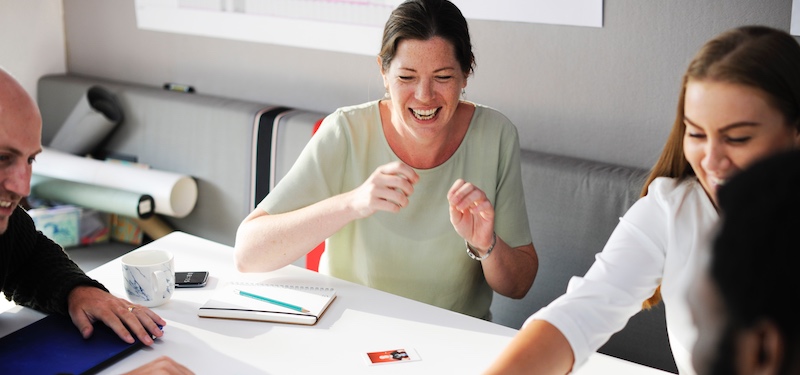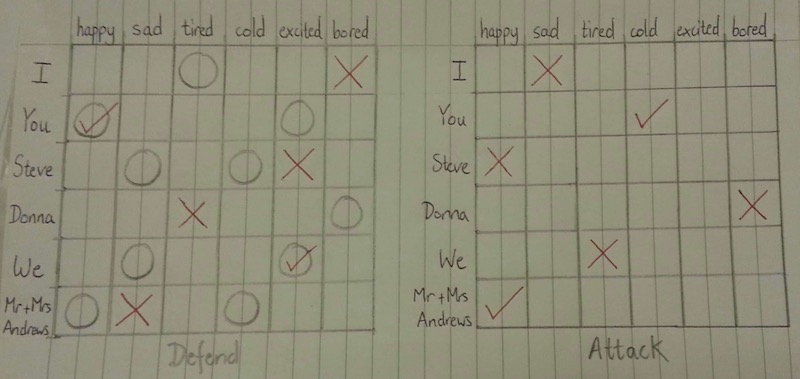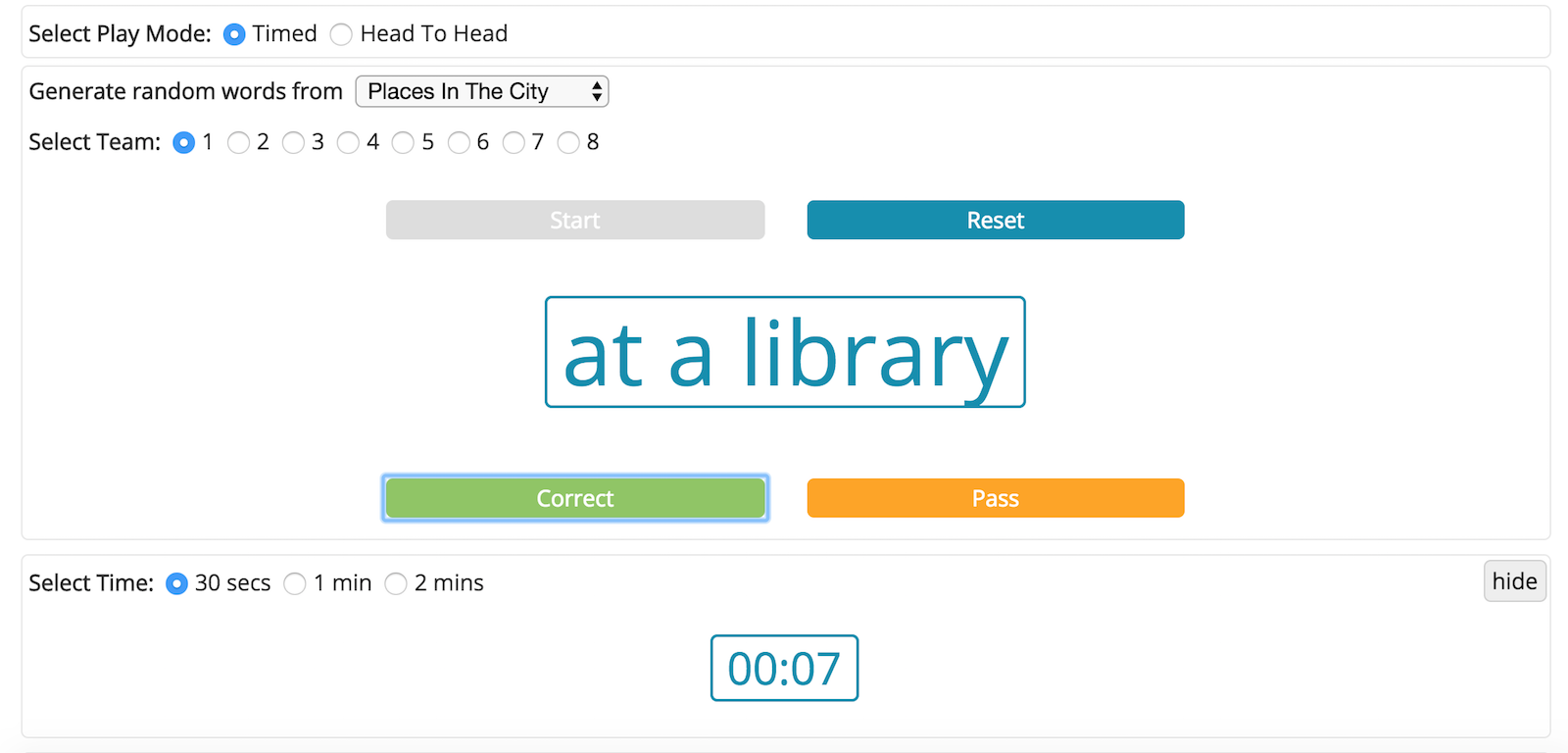10 Effective English Grammar Games

10 Effective English Grammar Games
In one form or another, grammar practice is an essential part of language learning. Traditional exercises (such as fill-in-the-blank sentences) play an key role in cementing knowledge, but they can quickly become tedious for students. Even more significantly, they often do little to build confidence when it comes to oral production of new language structures.
Thankfully, carefully chosen English grammar games can address both of these issues. Not only do they help refresh and re-engage your classes, they bridge the gap between those formulaic, ‘paint-by-numbers’ activities and more unstructured conversation.
The goal is to reach a point where students can produce grammar without consciously thinking about it – and focusing attention on a game while requiring use of the target language is a great way to do this. They increase familiarity and lower student inhibitions related to a new structure, and often practise producing language at speed as well.
We commonly think of games as only relevant to vocabulary review, but there are many available for grammar practice too. Some allow you to use questions/challenges of your choice; Jeopardy, Target Practice, Jenga, Hot Potato and Musical Chairs to name just a few. The classic Sentence Scramble exercise can be adapted into a game for any structure, while Run To It is particularly suited to prepositions or articles, and Connect Four to irregular verbs.
In this list however we focus on ten English grammar games that involve the spoken production of specific clauses, which will help students use that language with more confidence going forward. We’ve provided an overview of each one, but for full instructions just click on the title of a game.
We’ll start with a game designed for beginners. There aren’t too many interesting ways to practise the verb ‘to be’, but an adapted version of the game Battleship(s) is definitely one of them. Students ask and answer questions based around subject-verb agreement, and in doing so choosing the right form of ‘be’ for each subject becomes more natural for them.
The idea is that instead of the normal grid references used in Battleship, squares are referenced using a subject plus a feeling/activity. For example the square corresponding to the row ‘Donna’ and the column ‘tired’ becomes “Is Donna tired?” . If a battleship has been placed in that square an opponent answers in the affirmative “Yes she is.”, and if not the negative “No she isn’t”.
By using activities instead of feelings you can also practise the present continuous or future with going to. For example for the square in row ‘Marcus’ and ‘play tennis’, “Is Marcus playing tennis?” or “Is Marcus going to play tennis?”.

Change Chairs is a really fun game that you can use with beginner or intermediate classes. As it requires students to move quickly, it’s perhaps most suited to children and teenagers; but it can be very popular with adults too, as long as they’re comfortable with something more active.
Players sit in a circle of chairs, facing inwards, while one person stands in the middle. The person in the middle says a sentence starting with the prefix “Change chairs if…”, e.g. “Change chairs if you are wearing jeans.” If that sentence is true for a student, they have to stand up and move to a different chair, while the person in the middle also has to try and sit down. The student left standing up has to provide the next sentence!
The great thing about Change Chairs is its flexibility – you can use it to practise the present simple, present continuous, past simple or present perfect simple. The present simple and continuous versions are most suited to kids/low level students just familiarising themselves with the tense, because the structure is very repetitive. Present simple clauses could cover basic personal information (e.g. …you have a sister, …you have brown eyes), likes and dislikes (you don’t like mushrooms), or hobbies (with or without adverbs of frequency, e.g. …you go swimming once a week). The present continuous usually works best with clothes and accessories (e.g. …you are wearing a watch).
The past simple and present perfect simple on the other hand allow students to practice employing those past/past participle verb forms. For the past simple, students can talk about completed past actions at specific times (e.g. …you ate rice yesterday), and for the present perfect simple, experiences (e.g. …you have gone surfing).
Another enjoyable game you can tailor to a few different types of grammar is Two Truths A Lie. You can base the game on sentences using the present simple, past simple, present perfect simple, or ‘used to’, but a particular focus is on questions in the present or past simple. As it requires students to think of their own sentences and questions in the target grammar, it’s best for those already comfortable with the sentence structure, but who just need a little more practice producing it.
Each student writes three sentences about their life (in your chosen tense), two of which are true, and one of which is a lie. The students take turns presenting their sentences to the class, pretending that all three sentences are true by inventing information about their lie. Their classmates have to ask them questions about each statement to try and work out which one is the lie. Note that if the statements are experiences in the present perfect simple (e.g. I have eaten snails), the questions will use the past simple to ask about the specific time that experience was had (e.g. Where did you eat snails?).
To add a more competitive element to Two Truths And A Lie, count student votes on which statement they believe is the lie – the student who manages to fool the most classmates is the winner! Alternatively, a gameshow-style variation on the same premise is Would I Lie To You. Three teammates each read out one statement (two of them a lie, one being true), and the rest of the class have to work out which student is telling the truth. This is based on the BBC TV panel show of the same name, which you can watch a clip of below.
If you’re looking to familiarise students with the present perfect simple while it’s still new to them, then Never Have I Ever is an ideal choice. In this game players take turns making sentences about things they have never done, for example “I have never visited the USA” . As this basic form is repeated throughout the game, it’s perfect for those just getting used to the structure of the tense, and the use of past participles.
Each student has five ‘lives’, represented by the outstretched fingers of one hand. If a student has done the activity mentioned in a sentence, they lose a life (and put one finger down). The last player with a life remaining is the winner. Students will have a lot of fun trying to think of activities their classmates have done but they haven’t!
A good extension with smaller groups is to require students, when they lose a life, to give more specific information about their experience. For example “I went on holiday to Florida when I was twelve”. This is a great way to establish the relationship between the present perfect simple and the past simple, and could easily lead in to a game of Two Truths And Lie, as described above.
Another game that utilises a set phrase in the present perfect simple is the guessing game, What Just Happened. The difference this time is that it includes the adverb ‘just’, so use it after introducing your class to this concept. It also involves producing the language at speed, so encourage students to make use of the contraction “You’ve…”.
Like in Charades or Reverse Charades, players act clues for their teammates, but instead of acting the sentence itself, they show the reaction to a situation. For example for “You’ve just lost your keys”, students would pretend to look for their keys, patting their pockets etc.
As the guessing involves shouting out a sentence rather than a single word, it usually works better with one student guessing a situation on the board (as in Reverse Charades), so they can be heard clearly. Our interactive What Just Happened game has been developed specifically for this purpose and comes loaded with suitable sentences – no prep required!
How to use the past perfect simple correctly is something that many high intermediate or even more advanced students find difficult. A game that really helps with the concept of ordering events (i.e. using the past perfect simple for an event that happened before another event in the past simple) is Timeline*.
Players are given random historical events one at a time, which they have to place in chronological order. The key element is that students have to ‘narrate’ their placement using the target language as they make it. For example, “When astronauts walked on the moon William Shakespeare had definitely written Romeo and Juliet…but I don’t think the Beatles had broken up yet”. Note that the past perfect is not strictly necessary in these types of descriptions, so you could also use the game to practise only the past simple with lower levels.
Obviously it takes quite a bit of preparation time and effort to write out enough of these events. That’s why we made our interactive Timeline game (screenshot below). Project the game on the board, and 1-4 teams can take turns dragging an event into the correct order. All the pre-loaded events are written in the present simple, so that students practise converting the tense to either the past simple or past perfect simple.
*This game is in no way affiliated with the ‘Timeline’ card game

The classic party game Who Am I, in which players have to guess the person assigned to them, is a popular choice in English classes. The trick however is knowing how to adapt your setup to the grammar you want to practise. Specifically, the game always centres around forming yes/no questions, but the choice of people to be guessed affects the tense students will use.
You can either play with the names of people written/projected on the board behind a single student, or with a post-it note stuck to each student’s head. The board allows you to reduce the setup time (you could use our pre-made Who Am I game), but post-it notes do mean more students can interact and speak at once.
To practise the present simple with beginners, use living people that the students know well, such as current celebrities or people in the class. Questions topics could include nationality (Am I from Europe?), profession/hobbies (Do I play football?), or physical appearance (Do I have short hair?). To practise basic past simple with similar topics (e.g. Was I a musician?), just use deceased historical figures – John Lennon, Nelson Mandela etc.
A lesson common but useful version instead allows you to practise the present perfect continuous with intermediate classes. Again you need to use people in the class or current celebrities, but this time students ask questions about recent activities. For example, “Have I been studying hard?” or “Have I been posting on social media a lot?”.
While in Who Am I the guesser asks questions, in Where Am I it’s their classmates who provide statements as clues. The best way to play is with a place written/projected on the board behind one student. Each student must only give one clue at a time.
You can adapt the game to different language topics by requiring different types of statements. Your target grammar will also influence your choice of places. For example with low-level beginners or kids, you could simply ask for there is/are sentences describing the objects/features in that place, e.g. “There are lots of trees”. This works particularly well with natural environments or rooms of the house vocabulary.
With intermediate students you could practise modal verbs of obligation or permission, with students giving rules for a given place. Places in the city work best here, e.g. “You have to be quiet in here”, or “You can eat here”. To practise modal verbs of advice (e.g. You should visit the castle), try cities or countries – just make sure you outlaw proper nouns! Cities and countries also work well if you ask students to imagine they are visiting those places, with recent actions given in the present perfect continuous (e.g. You have been eating a lot of rice).
Our interactive Where Am I game comes preloaded with suitable vocabulary sets for all these cases. You can even create a custom set of places for particular words your class has been studying, or places they are familiar with.

As the name suggests, Consequences involves guessing situations and results in the first conditional. It’s perfect for taking students who are happy with the form to the next step – producing the grammar required naturally, at speed, without having to think about it.
The idea is that students have to complete a sentence, using the correct ‘if clause’ or main clause. For example, if the clause to be guessed is “You will celebrate”, clues could include “If you pass the exam…” or “If your team wins…”. But if the clause to be guessed is “If it’s sunny”, clues would be of the form “We will have a picnic…” or “We’ll play outside…”.
You can play the game with one student standing at the front giving clues for their team (better with larger classes). Or you could write/project clauses behind a student at the front, with their teammates giving clues. Either way, our interactive Consequences game has lots of suitable clauses ready for you to use.
Our final suggestion is a ‘Mr and Mrs’-style game, in which players try to match the answers of their partner. With some creative questions you might be able to adapt it to almost any grammar, but we’ve found it works best with the present simple, past simple, future simple or second conditional.
Questions are presented to the class one at a time, e.g. “If they won the lottery, what would they buy first?”. One student in each pair writes down the answer for themselves, while their partner writes down what they think their partner’s answer is. The pairs then take turns sharing their answers, with the student who wrote about their partner going first. For example, “I think Luiza would buy a house first if she won the lottery.” … “No! If I won the lottery I would buy a car!”.
As players can use the question provided to help form their own sentences, it’s a fairly low-intensity grammar exercise. It’s perfect for those who are just getting used to a new structure, or perhaps a little low on confidence.
Don’t have time to prepare the questions, or struggling for ideas? Just use our How Well Do You Know Your Friend Generator!

